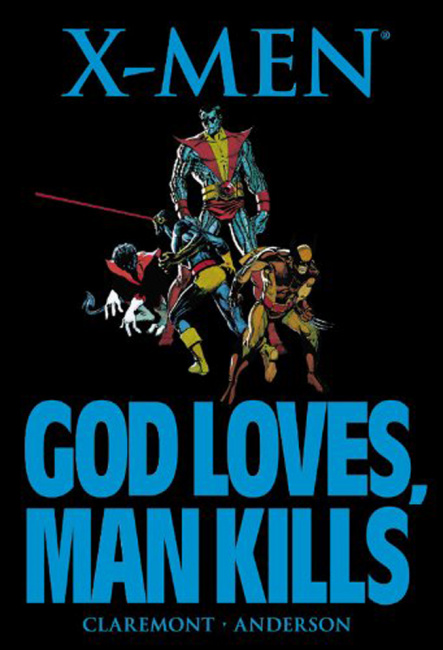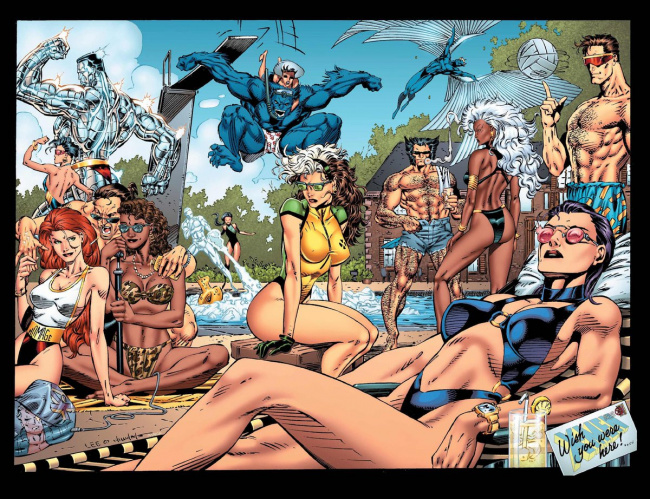Confessions of a Comic Book Guy is a weekly column by Steve Bennett of Super-Fly Comics and Games in Yellow Springs, Ohio. This week, Bennett addresses Florida House Bill 1521, talks Maia Kobabe’s graphic novel memoir Gender Queer, and looks back on the cultural zeitgeist captured in Marvel’s Swimsuit Specials of the 90s.
I know it’s not Pride Month yet, and I honestly try not to write about every single new comic book-adjacent outrage that hits the Internet, but when this first story was waiting for me in my newsfeed this morning, what else could I do but lean into it?
While discussing Florida House Bill 1521, which “criminalizes the use of public bathrooms for transgender people” in a committee hearing, Representative Webster Barnaby compared the transgender persons and parents of transgender children, who were there to speak out against the bill, “to Marvel’s X-Men, characters in the comics in which bigotry, hatred, and fear of mutants are central themes.”
In a rant that could have been by the character Reverend Stryker from the graphic novel God Loves, Man Kills by Chris Claremont and Brent Anderson, Barnaby said: “I’m looking at society today and it’s like I’m watching an X-Men movie. When you watch the X-Men movies or Marvel comics, it’s like we have mutants living among us on planet Earth.” He also added, “The Lord rebukes you, Satan, and all of your demons and all of your imps who come parade before us. That’s right, I called you demons and imps who come and parade before us and pretend that you are part of this world.”
Barnaby later offered an apology, as reported by WESH. “I would like to apologize to the trans community for referring to you as demons,” he said.
In an article on the recent bouts of book banning that included an interview with author Judy Blume (Tiger Eyes, Forever, etc.) in the Guardian, Blume gave an unprompted positive review for Maia Kobabe’s graphic novel memoir Gender Queer (see “‘Gender Queer’ Was The Most Frequently Challenged Book In 2021”) “which recounts Kobabe’s journey to adulthood and exploring their gender identity and sexuality.” In the interview, Blume said:
“It’s probably the number one. banned book in America right now. And I thought, ‘This young person is telling me how they came to be what they are today.’ I learned a lot, and became even more empathetic. That’s what books are all about.” Blume added, “No child is going to become transgender or gay or lesbian because they read a book. It’s not going to happen. They may say, ‘Oh, this is just like me. This is what I’m feeling and thinking about.’ Or, ‘I’m interested in this because I have friends who may be gay, bi, lesbian.’ They want to know!”
One thing I’ve learned over the nearly two decades that I’ve been writing these things is once something has been created, creators have no control over what people make of it. Like when you discover that canonically straight cartoon characters like She-Go, from Disney’s Kim Possible, have been a gay icon for nearly two decades without me knowing about it (see “Confessions Of A Comic Book Guy — He-Man: Missing In Action).
Or take, for instance, the Marvel Swimsuit Specials. Most fans I know, myself included, considered them to have been cringy cash grabs for sweaty adolescents with no access to porn and Marvel completists who had to have everything labeled “Marvel.” But, to be fair, as Marvel itself said in a post last month, the 1990s really was, according to Marvel itself, “a time when beach culture and swimwear were at the center of pop culture” (i.e. Baywatch, Sports Illustrated Swimsuit issues, etc.). And the Marvel Swimsuit Special “captured the cultural zeitgeist of the time” (a.k.a., this was another example of Marvel once again chasing a fad).
Which is as may be, but according to Cameron Scheetz in a piece for Queerty, those Marvel Swimsuit Specials apparently had a whole other audience. He writes, “On one hand, these overblown portrayals of impossible physiques no doubt contributed to harmful body image issues for Gen X-ers and Millennials who came of age at the time. On the other, the bold, bulging, overtly thirsty images provided an avenue for readers of all ages to explore desire—not to mention a safe space for burgeoning queer folks to look, admire, and… find some things out about themselves!”
To promote the upcoming Summer Of Symbiotes event, Phillip Tan and Scott Williams have crafted an image similar to Jim Lee and Scott Williams iconic “poolside pinup” from 1991’s X-Men #1. But now that the Marvel Voices: Pride anthologies are a yearly thing, they might want to further tap into its audience by doing a Marvel Voices Pride Swimsuit Special for next year’s Pride Month. Imagine the outrage!
The opinions expressed in this column are solely those of the writer, and do not necessarily reflect the views of the editorial staff of ICv2.com.
Source: ICv2





